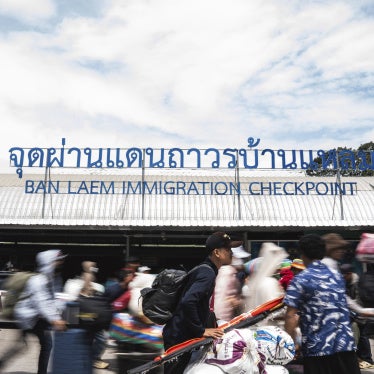(New York) - Australia's new prime
minister, Julia Gillard, should lift the suspension on new asylum claims by Sri Lankans when the three-month moratorium expires on July 8, 2010, Human Rights Watch said today. The government should also lift the suspension on Afghan asylum claims, which have been halted until October, Human Rights Watch said.
The suspension policy, adopted on April 8 because of allegedly improved security situations in Sri Lanka and Afghanistan, fails to recognize that certain groups and individuals in Sri Lanka and Afghanistan remain extremely vulnerable to persecution and may have legitimate claims for asylum, Human Rights Watch said. The policy also violates Australia's obligations under international law not to discriminate in the treatment of refugees.
"Prime Minister Gillard has a chance to turn her eloquent rhetoric on refugees into positive action," said Elaine Pearson, acting Asia director at Human Rights Watch. "Ending the suspension of Sri Lankan and Afghan claims would be an excellent start to Gillard's government and demonstrate her commitment to human rights."
After becoming prime minister on June 24, Gillard stated, "I believe this nation needs to honor its obligations to people who are genuine refugees, and honor what I think is an Australian value about care and concern for children."
In an April 14 letter
to the minister for immigration and citizenship, Chris Evans, Human Rights
Watch said that the blanket suspension of all applications from nationals of
specific countries without providing them protection is an unprecedented step
by a country that is party to the 1951 Refugee Convention and has an
individualized asylum procedure. It is discriminatory and violates the
international right to seek asylum as guaranteed by the Universal Declaration
of Human Rights. Even if human rights conditions have improved in a country of
origin, Australia is still obligated to provide individuals with an opportunity
to claim asylum and to examine their refugee claims. Human Rights Watch has yet
to receive a response to its letter.
Human Rights Watch's research shows that human rights conditions in both Afghanistan and Sri Lanka remain problematic and unstable. In both countries, certain ethnic and religious minorities and individuals who criticize the government continue to face significant threats and lack effective protection.
"Every asylum seeker has a right to make a claim," Pearson said. "The Australian government shouldn't pick and choose on the basis of nationality."
Human Rights Watch said that in 2008, the then-new Labor government in Australia initially made good on its election promises to protect the rights of refugees. But over the past two years, the government has changed course.
Asylum seekers who arrive in Australia by boat are subject to mandatory detention, and Christmas Island's detention centers are again filled with asylum seekers. With their claims for protection suspended, Afghan and Sri Lankan boat people, including children, have been made to endure the hardship of additional months of detention, regardless of the merits of their refugee claims.
"In an election year, the Gillard government should reset the debate on the treatment of refugees and end refugee bashing for political gain," Pearson said. "Australia should be setting a positive example for refugee protection in the region, not undermining international standards, and lifting the suspension
on asylum claims is a clear place where action is needed."








